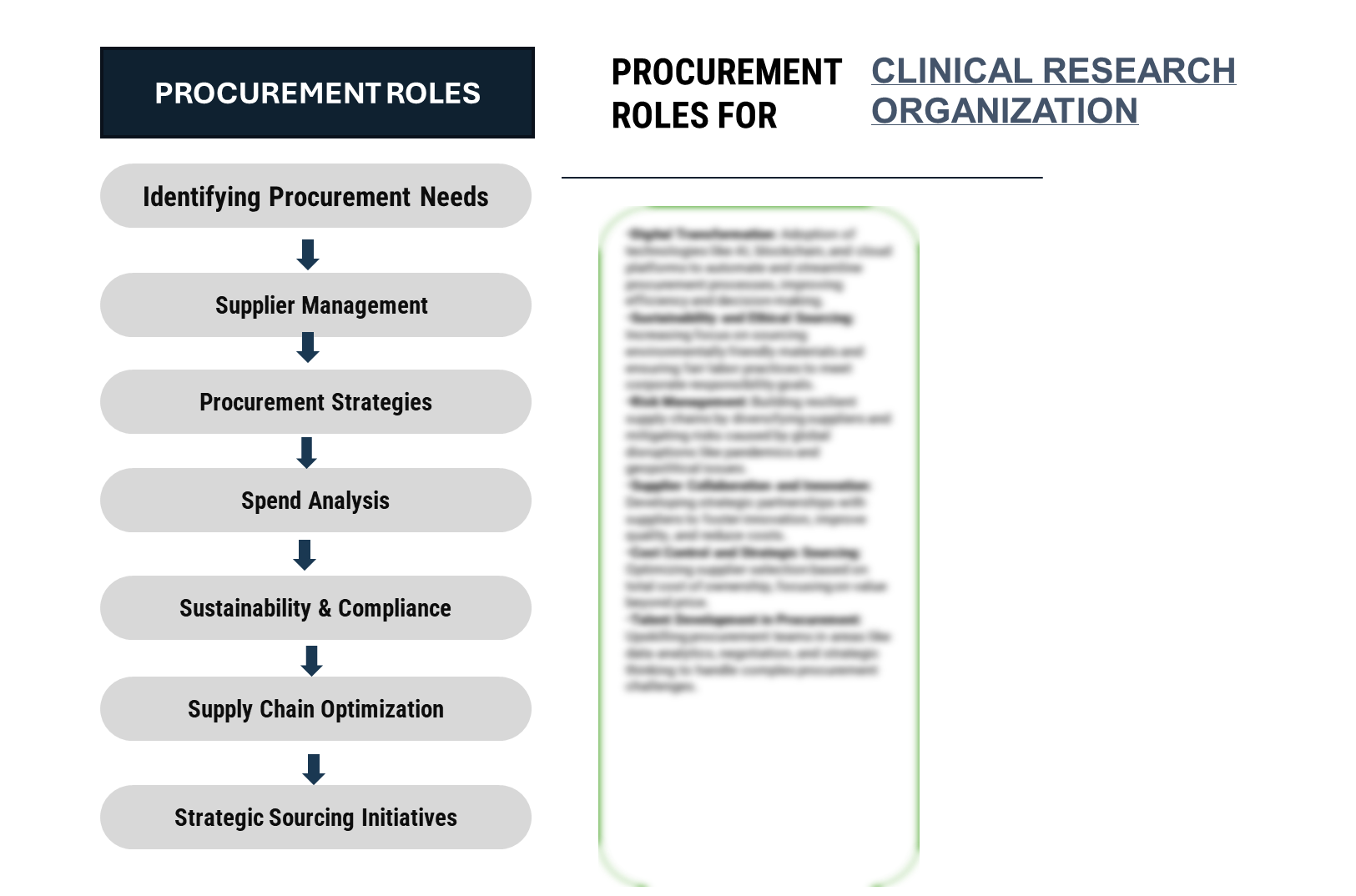Summary Overview
Clinical Research Organizations (CRO) Market Overview
The global Contract Research Organization (CRO) services market is experiencing robust growth, driven by increasing pharmaceutical R&D expenditure, technological advancements in clinical trials, and the rising cost of in-house drug development. This sector is expected to reach a value of approximately $82.0 billion by 2024, with a compound annual growth rate (CAGR) of 9.6% from 2024 to 2032.
Growth rate: 9.6%
Key Drivers and Growth Trends:
Pharmaceutical R&D Growth: The rising need for research and development in the pharmaceutical sector, especially for biologics, biosimilars, and complex therapies like cell and gene treatments, is accelerating the demand for CRO services.
Technological Innovations: Advancements in clinical trial technology, such as decentralized trials and artificial intelligence, are improving the efficiency and reach of CRO services. Real-world data and evidence are also becoming increasingly significant in shaping clinical research.
Cost-Efficiency: Many pharmaceutical companies are shifting towards outsourcing clinical trials to CROs due to the high cost and resource requirements associated with in-house drug development.
Key Market Segments:
Clinical Trial Services: These services are categorized into different phases (I-IV), with Phase III trials gaining momentum due to their use in evaluating the efficacy of pipeline drugs.
Therapeutic Areas: Oncology, infectious diseases, and rare diseases are seeing heightened activity, driven by strong R&D pipelines and a growing need for advanced treatments.
Emerging Models: Hybrid CRO-CDMO (Contract Development and Manufacturing Organization) partnerships and novel clinical trial designs are expected to lead to growth, particularly as personalized and precision medicine gains traction.
Sustainability and Technological Transformations:
Digital Transformation: The widespread use of digital tools in clinical trial management is enhancing efficiency, helping CROs to optimize operations and reduce costs. AI-driven models, such as those offered by leading firms like IQVIA, are improving patient identification and trial predictions.
Sustainability Focus: CROs are increasingly incorporating sustainable practices into their operations, including environmentally conscious data management and resource optimization during clinical trials.
Regional Insights:
While North America remains the dominant region, Europe and the Asia-Pacific region are emerging as high-growth areas. Asia-Pacific is becoming a key destination for clinical trials due to its large patient pool and increasing demand for healthcare innovation.
Challenges:
Recruitment and Retention: Challenges in patient recruitment and retention are persistent, complicating the timely completion of trials. CROs are leveraging digital solutions to address these issues by improving patient access and engagement.
Overview of Market Intelligence and Procurement Strategies
Market intelligence services are becoming crucial for stakeholders in the CRO market, helping to manage procurement risks and optimize costs. By employing strategic sourcing practices, CROs can maintain high standards in service delivery while keeping operational costs in check.
Procurement Intelligence for Clinical Research Organizations (CRO) Market: Category Management and Strategic Sourcing
In the rapidly growing CRO market, companies are optimizing procurement strategies to maintain competitive advantage and streamline operations. By leveraging spend analysis solutions and vendor performance management tools, CROs can better manage their supplier relationships and control costs across the supply chain. Procurement category management is crucial in selecting the right service providers, ensuring timely access to clinical trial resources, and minimizing operational risks. Strategic sourcing is vital for obtaining the best contracts, particularly as the demand for specialized services, such as personalized medicine trials and data analytics, continues to rise.

Pricing Outlook for Clinical Research Organizations (CRO) Market: Spend Analysis
The Clinical Research Organizations (CRO) market is experiencing a dynamic pricing environment influenced by various factors such as increasing demand for clinical trials, technological advancements, and rising operational costs. This evolving landscape is shaping pricing trends in the sector, with projections indicating steady price increases over the coming years.
The line chart representing the pricing outlook for the Clinical Research Organizations (CRO) market from 2023 to 2033
Rising Labor and Operational Costs: The cost of skilled labour, including clinical trial managers, researchers, and data scientists, is increasing, adding pressure to pricing.
Technological Investments: The adoption of digital tools and AI-driven solutions, although enhancing efficiency, requires significant investment, influencing service pricing.
Increased Demand for Specialized Trials: As the demand for complex clinical trials, such as personalized medicine and oncology trials, grows, service providers are adjusting prices accordingly.
Regulatory and Compliance Costs: Stringent regulatory requirements are increasing the complexity of trials, leading to higher costs for CRO services.
Cost Breakdown for the Clinical Research Organizations (CRO) Market: Cost-Saving Opportunities
1. Clinical Services (40%-50%)
Description: Includes expenses related to conducting clinical trials, such as study design, patient recruitment, clinical monitoring, and data collection. These services are critical as they form the core of CRO offerings, meeting the demand for outsourcing to reduce operational timelines.
Trends: The use of decentralized clinical trials and advanced technologies, including artificial intelligence, optimizes costs and improves trial outcomes. Cost savings stem from reducing manual processes and streamlining trial operations.
2. Regulatory and Medical Affairs (XX%)
3. Labor Costs (XX%)
4. Infrastructure and Overheads (XX%)
Cost saving opportunity: Negotiation Lever and Purchasing Negotiation Strategies
Cost-saving opportunities in the Clinical Research Organizations (CRO) market include collaborative contracting to share costs, advanced electronic data management to minimize errors, and tailored regulatory compliance strategies to reduce delays. Technology integration like AI optimizes patient recruitment and trial monitoring, while streamlined logistics lower material shipping expenses. These approaches enhance efficiency and reduce overall trial costs.

Supply and Demand Overview of the Clinical Research Organizations (CROs) Market: Demand-Supply Dynamics and Buyer Intelligence for Effective Supplier Relationship Management (SRM)
The Clinical Research Organizations (CROs) market is growing rapidly, driven by an increase in clinical trial activity, rising demand for outsourcing services, and the globalization of pharmaceutical research. This growth is influenced by advancements in technology, a focus on cost reduction, and an increasing prevalence of complex diseases requiring innovative treatments.
Demand Factors:
Globalization of Clinical Trials: Growing international collaboration in pharmaceutical research has heightened demand for CRO services to manage diverse regulatory requirements.
R&D Investments: Increased investments in pharmaceutical R&D and biotechnology drive the need for CROs specializing in clinical trials.
Complex Therapeutics: The rise of biologics and personalized medicine requires specialized expertise, boosting demand for CRO services.
Cost Optimization: Outsourcing to CROs helps pharmaceutical companies reduce operational costs and accelerate drug development timelines.
Supply Factors:
Technological Advancements: Integration of AI, machine learning, and big data analytics enhances the operational efficiency and precision of CROs.
Global Presence: Leading CROs maintain a strong global presence, enabling access to diverse patient populations and streamlined operations.
Regulatory Harmonization: The adoption of standardized regulatory frameworks simplifies cross-border clinical trials, supporting supply consistency.
Competition and Consolidation: Increased competition and market consolidation among CROs drive innovations and improved service offerings.
Regional Demand-Supply Outlook: Clinical Research Organization (CRO) Market
The Clinical Research Organization (CRO) market is growing due to increasing demand for outsourcing in clinical trials. Here's a detailed regional outlook:
North America: A Leading Market
Dominance in Clinical Trials: The U.S. is the largest contributor, driven by its robust pharmaceutical and biotech industries, advanced research infrastructure, and a high number of ongoing clinical trials.
Therapeutic Focus: Major areas include oncology, cardiovascular diseases, and CNS disorders. In 2024, the American Cancer Society projected 2 million new cancer diagnoses in the U.S., fuelling CRO demand for oncology trials.
Corporate Innovation: Partnerships like those involving AI-driven trials enhance trial efficiency and inclusivity.
Investment in Expansion: Companies are expanding production capacities to support drug development and trials.

North America remains a key hub for Clinical Research organization market and its growth
Supplier Landscape: Supplier Negotiations and Strategies in the Contract Research Organization (CRO) Market
The Contract Research Organization (CRO) market features a robust supplier landscape consisting of service providers offering specialized solutions for pharmaceutical, biotechnology, and medical device companies. Key suppliers contribute to various stages of clinical trials, drug development, and regulatory compliance.
Key Suppliers in the CRO Market:
Charles River Laboratories, Inc.
IQVIA
PAREXEL International
Syneos Health
LabCorp Drug Development
Pharmaceutical Product Development (PPD)
Key Development: Procurement Category significant development
Procurement Category |
Significant Development |
Source |
Technology Integration |
Increased use of AI, machine learning, and data analytics to enhance clinical trial management and data analysis. |
IQVIA |
Outsourcing and Globalization |
Rising trend of outsourcing clinical trials to global CROs, particularly in emerging markets. |
Charles River Laboratories, Inc. |
Supply Chain & Logistics |
Enhancements in logistics to improve the efficiency of sample collection and transportation across international sites. |
LabCorp Drug Development |
Regulatory Compliance |
CROs investing in compliance systems to meet stringent regulatory requirements in multiple global markets. |
PAREXEL International |
Vendor Management |
Increasing reliance on third-party providers for specialized services, such as clinical trial monitoring and laboratory testing. |
Syneos Health |
Sustainability and CSR |
Focus on sustainable practices in clinical trials, reducing the environmental impact of research activities. |
Pharmaceutical Product Development (PPD) |
Procurement Attribute/Metric |
Details |
Market Sizing |
The global healthcare CRO market is projected to grow from USD 44.02 billion in 2023 to USD 77.62 billion by 2030, with a CAGR of 9.6% during the forecast period. |
Adoption of CRO Services |
Increasing outsourcing of clinical trials due to cost-effectiveness and access to expertise is fuelling market growth. Adoption of smart analytics and real-time data acquisition platforms is enhancing the monitoring and management of clinical trials. |
Top Strategies for 2024 |
Focus on expanding service offerings, particularly in regulatory and medical affairs, leveraging technological advancements, and strategic partnerships to enhance clinical trial efficiency. |
Automation in Clinical Trials |
Over 60% of CROs are adopting AI, machine learning, and advanced data analytics to optimize trial processes, improve data accuracy, and reduce operational costs. |
Procurement Challenges |
Key challenges include regulatory compliance, rising competition, data security concerns, and managing the increasing complexity of clinical trials, especially with biologics and biosimilars. |
Key Suppliers |
Major players include ICON plc, IQVIA Inc., Syneos Health, Charles River Laboratories, and Parexel International. |
Key Regions Covered |
Key markets include North America, Europe, and Asia-Pacific, with significant growth observed in the U.S., Japan, and China. |
Market Drivers and Trends |
Growth is driven by increased R&D activities, rising demand for biosimilars, biologics, and expanding regulatory services. A growing focus on patient recruitment and retention is also a key driver. |










